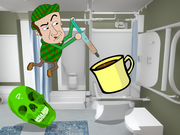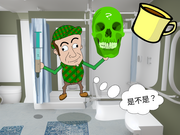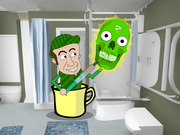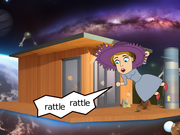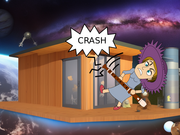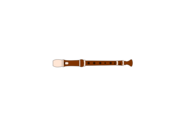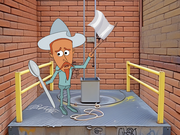still / still in progress / still more / yet / even more / in addition / fairly / passably (good) / as early as / even / also / else
to be (followed by substantives only) / correct; right; true / (respectful acknowledgement of a command) very well / (adverb for emphatic assertion)
是
=
旦
+
龰
:
Mnemonic symbol: a skull, from "to be or not to be".
Sherlock Holmes (sh) starts his day in the space station's bathroom (Ø4) with a mug of coffee (旦). Holding a skull (mnemonic symbol for 是) in his hands, he asks himself "to be, or not to be" (是). He wonders if he can make the skull come back to life using lots of coffee, and injects coffee from his mug into the skull using a syringe (龰).
Sherlock Holmes (sh) starts his day in the space station's bathroom (Ø4) with a mug of coffee (旦). Holding a skull (mnemonic symbol for 是) in his hands, he asks himself "to be, or not to be" (是). He wonders if he can make the skull come back to life using lots of coffee, and injects coffee from his mug into the skull using a syringe (龰).
是
=
日
+
下
+
人
:
Mnemonic symbol: a skull, from "to be or not to be".
Sherlock Holmes (sh) watches the Neanderthal Man (人) trying to climb to the sun (日) on a ladder (下) in the space station's bathroom (Ø4). Sherlock is afraid that he'll open the window, so he puts on a big skull (是) and scares him off.
Sherlock Holmes (sh) watches the Neanderthal Man (人) trying to climb to the sun (日) on a ladder (下) in the space station's bathroom (Ø4). Sherlock is afraid that he'll open the window, so he puts on a big skull (是) and scares him off.
light / easy / gentle / soft / reckless / unimportant / frivolous / small in number / unstressed / neutral / to disparage
(completed action marker) / (modal particle indicating change of state, situation now) / (modal particle intensifying preceding clause)
to finish / to achieve / variant of 瞭|了[liao3] / to understand clearly
了
=
乛
+
亅
:
Mnemonic symbol from "to finish" and the shape of the character: a prize cup.
Li Qingzhao (li) is responsible for manufacturing a prize cup (了). She only needs to add a poetic engraving. Unfortunately, she suffers from a writer's block. In the aorta's living room (ao3), someone left a cryptic message engraved on the walls using a sickle (乛), which is still lying on the floor. Being an accomplished poet Li Qingzhao is able to understand the message clearly (了), realizes its poetic potential and starts to engrave it on the prize cup using a crowbar (亅).
Li Qingzhao (li) is responsible for manufacturing a prize cup (了). She only needs to add a poetic engraving. Unfortunately, she suffers from a writer's block. In the aorta's living room (ao3), someone left a cryptic message engraved on the walls using a sickle (乛), which is still lying on the floor. Being an accomplished poet Li Qingzhao is able to understand the message clearly (了), realizes its poetic potential and starts to engrave it on the prize cup using a crowbar (亅).
again; once more; re- / second; another / then (after sth, and not until then) / no matter how ... (followed by an adjective or verb, and then (usually) 也[ye3] or 都[dou1] for emphasis)
to hold / to seize / to catch / to apprehend / to take / (used in the same way as 把[ba3]: to mark the following noun as a direct object)
one / single / a (article) / as soon as / entire; whole; all; throughout / "one" radical in Chinese characters (Kangxi radical 1) / also pr. [yao1] for greater clarity when spelling out numbers digit by digit
(classifier used before a noun that has no specific classifier) / (bound form) individual
important point; main point; focus / key (project etc) / to focus on; to put the emphasis on
heavy / serious / to attach importance to
point / dot / drop / speck / o'clock / point (in space or time) / to draw a dot / to check on a list / to choose / to order (food in a restaurant) / to touch briefly / to hint / to light / to ignite / to pour a liquid drop by drop / (old) one fifth of a two-hour watch 更[geng1] / dot stroke in Chinese characters / classifier for items
variant of 人[ren2] / "person" radical in Chinese characters (Kangxi radical 10), occurring in 兒, 兀, 兄 etc
child / son
儿
=
丿
+
乚
:
Mnemonic symbol: "son" (儿) sounds similar to "Sun" like in "Sun Wu Kong", so it's gonna be represented by the monkey king. Albert Einstein (Ø-) and Sun Wu Kong (儿) are fighting in the space station's kitchen (-Ø2). Their weapons: Albert Einstein has a shovel (乚), and Sun Wu Kong has a banana (丿).
of; ~'s (possessive particle) / (used after an attribute) / (used to form a nominal expression) / (used at the end of a declarative sentence for emphasis) / also pr. [di4] or [di5] in poetry and songs
to come / to arrive / to come round / ever since / next

